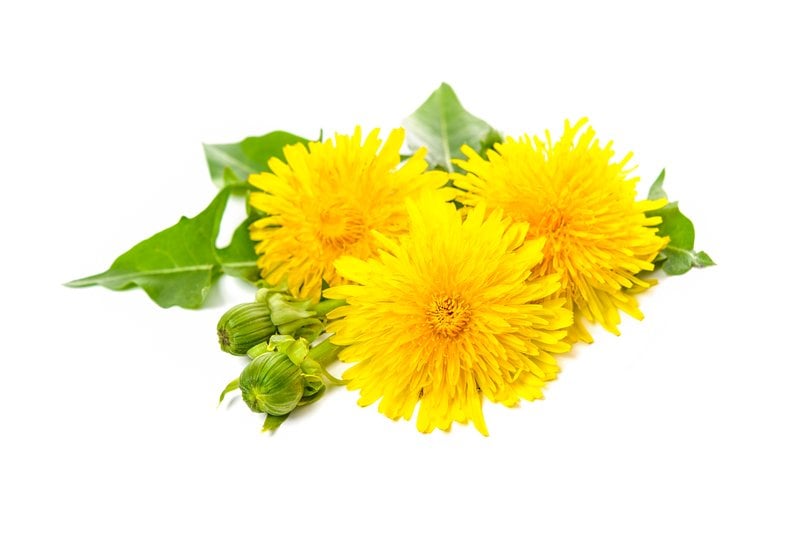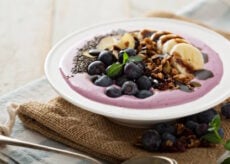9 Powerful Health Benefits of Dandelion (and how to use them)

Those bright yellow blossoms sprinkled across the lawn are one of the first signs of spring. Although these yellow flowers can be considered a nuisance, reaping havoc on landscapes, some see them as nostalgic emblems announcing the arrival of warmer weather and sunny days. They’re also one of the first flowers to bloom in spring, making them a vital food source for insects (including honey bees) and birds.
In short, these delicate daisies are much more than weeds that appear with spring showers. Dandelions have long been used as traditional medicine and are regarded as a symbol of healing and resilience. This is in part because dandelions are rich in nutrients packed with healthful properties.
For example, dandelions contain over 100 phytochemicals and are not only abundant in vitamins A, C, and K, but also contain vitamin E, folate, and small amounts of other B vitamins. They are even sources for several minerals, including iron, calcium, magnesium, and potassium. On top of that, dandelions possess characteristics that have shown favorable effects on health and wellbeing. Although more research still needs to be done to back-up dandelions’ suspected beneficial effects in humans, here are 9 potential health benefits of dandelion.
9 Health Benefits of Dandelion
1. Support Liver Health
Among the many health benefits of dandelion, they are best known for their detoxifying effects. Dandelions have a long history of helping ease problems of the liver, gallbladder, and bile ducts. Dandelion tea is even considered a “liver tonic,” since it may help detoxify the liver and improve the flow of bile. Many recent animal studies support the use of dandelion to reduce levels of excess fat stored in the liver, protect against oxidative stress in tissue, and lessen the extent of liver damage. 1,2,3
2. Support Healthy Inflammation
Dandelions contain bioactive compounds like polyphenols, which may aid in a healthy inflammatory response. Some studies have revealed significantly reduced inflammatory markers in cells treated with dandelion compounds. 4,5 Further studies have shown dandelion’s anti-inflammatory properties may help alleviate swelling and other health issues related to inflammation. 6
3. Support Healthy Digestion
Dandelion root is also high in inulin, a prebiotic fiber. Research indicates that inulin may help increase intestinal movement. 7 Further, it has historically been used to improve appetite, soothe minor digestive ailments, and possibly relieve constipation.
4. Boost Immune Function
Dandelion may even contain antimicrobial and antiviral properties, which could support your body’s ability to fight infection. Several studies found that dandelion extract may significantly reduce the ability of viruses to replicate. 8 Research also indicates that some of the active compounds in dandelion may protect against various harmful bacteria. 9,10
5. Support Healthy Skin
Dandelion may also protect against skin damage from sunlight, aging, and acne. One study, in particular, found that dandelion leaves helped protect against skin damage when applied just prior to or immediately after sun exposure. 11 Even more, some of the other purported health benefits of dandelion include reduce skin inflammation and irritation while also increasing hydration and collagen production. 12
6. Help with Weight Management
Dandelion is commonly used among those who are trying to lose or maintain their weight. This is due to its potential to improve carbohydrate metabolism and help reduce fat absorption, which may lead to weight loss. A study from the Journal of Nutrition Research and Practice concluded that dandelion could also have similar effects on the body as popular weight-loss drugs by inhibiting pancreatic lipase, an enzyme released during digestion to break down fat. 13
7. Lower Blood Pressure
Dandelions are a natural diuretic. Diuretics are used to rid the body of excess fluid, which can lead to lowered blood pressure. In addition to their diuretic properties, dandelion contains potassium, which is associated with lowering blood pressure. 14
8. Reduce Cholesterol
Some of the compounds found in dandelions may also help reduce cholesterol. One study found dandelion extract greatly reduced cholesterol and triglyceride levels.15 Similarly, another study found adding dandelion roots and leaves reduced cholesterol levels in individuals who consumed high-cholesterol diets. 16
9. Manage Blood Sugar
Dandelion may also help improve insulin sensitivity and reduce blood sugar through its bioactive compounds. These compounds have been shown to help increase insulin sensitivity by slowing the flow of sugar from the intestines to the bloodstream and thus preventing spikes in blood sugar. 17
How to Use Dandelion
As a whole, dandelions seem to pack a punch when it comes to benefiting your health, but now you may be wondering how exactly you are supposed to include dandelions into your diet. As it turns out, you can get the health benefits of dandelion in a variety of ways ranging from raw to cooked to dehydrated. (All forms are considered safe.) If you are not buying them from a store, just make sure that wherever you pick them has not been sprayed with herbicides or pesticides.
Although I have not had the opportunity to try dandelion, when eaten raw, the taste is described as being both earthy and slightly bitter… in the best way possible.
The earlier dandelions are picked, the less bitter they will be. This means that fresh, young spring dandelions are best for eating raw in salads and sandwiches. However, dandelion’s concentrations of inulin are at their highest in the fall, which makes them great to use in teas. Dandelion leaves and roots can be dried and consumed as a tea, which is not only favored for its health benefits but also because dandelion acts and tastes like a caffeine-free substitute for coffee. The flavor is said to resemble that of chicory, which is another reason why dandelion tea is so popular.
Currently, dandelion is classified as a dietary supplement by the U.S. Food and Drug Administration. As a result, dandelion can also be purchased in capsules, extracts, and powders if you don’t want to test out your hunter-gatherer skills. Nonetheless, there are no standardizations on how much dandelion should be consumed. But some dosage recommendations do exist. For example:
- 2 to 10 grams of fresh dandelion leaves/root daily
- 3 to 4 grams mixed with 150 milliliters of warm water of dandelion root powder
- 1 tablespoon chopped dandelion for tea infusion
- 1 to 2 tablespoons of fresh root extract daily
- 0.75 to 1.0 grams daily of dried dandelion extract
All things considered, dandelion could be one of the most underrecognized food powerhouses with its abundance of nutrients and health benefits. Although they have gained a bad reputation among many homeowners, a new, more positive light can be shed due to all the potential health benefits of dandelion.
Luckily, dandelions are beginning to see some well-deserved positive attention as they historically had with ancient medicine. So, for those looking for natural remedies or even those just looking for a little symbol of sunshine in their day, the antidote may be closer than you think and maybe even be stowed away in your own backyard.







